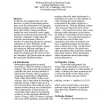Free Online Productivity Tools
i2Speak
i2Symbol
i2OCR
iTex2Img
iWeb2Print
iWeb2Shot
i2Type
iPdf2Split
iPdf2Merge
i2Bopomofo
i2Arabic
i2Style
i2Image
i2PDF
iLatex2Rtf
Sci2ools
106
click to vote
NN
2006
Springer
2006
Springer
Neural voting machines
In theories of cognition that view the mind as a system of interacting agents, there must be mechanisms for aggregate decision-making, such as voting. Here we show that certain voting procedures studied by social scientists can be implemented as recurrent neural networks. For example, a standard "winner-take-all" network can determine which of a number of competing alternatives garners a plurality of votes. Similarly, in the special case where voters share a model governing the different rankings of alternatives, the Borda procedure can easily be computed. In the face of voter un-certainties, this Borda network returns the maximum likelihood choice.
Aggregate Decision-making | Certain Voting Procedures | Neural Networks | NN 2006 | Recurrent Neural Networks |
Related Content
| Added | 14 Dec 2010 |
| Updated | 14 Dec 2010 |
| Type | Journal |
| Year | 2006 |
| Where | NN |
| Authors | Whitman Richards, H. Sebastian Seung, Galen Pickard |
Comments (0)

